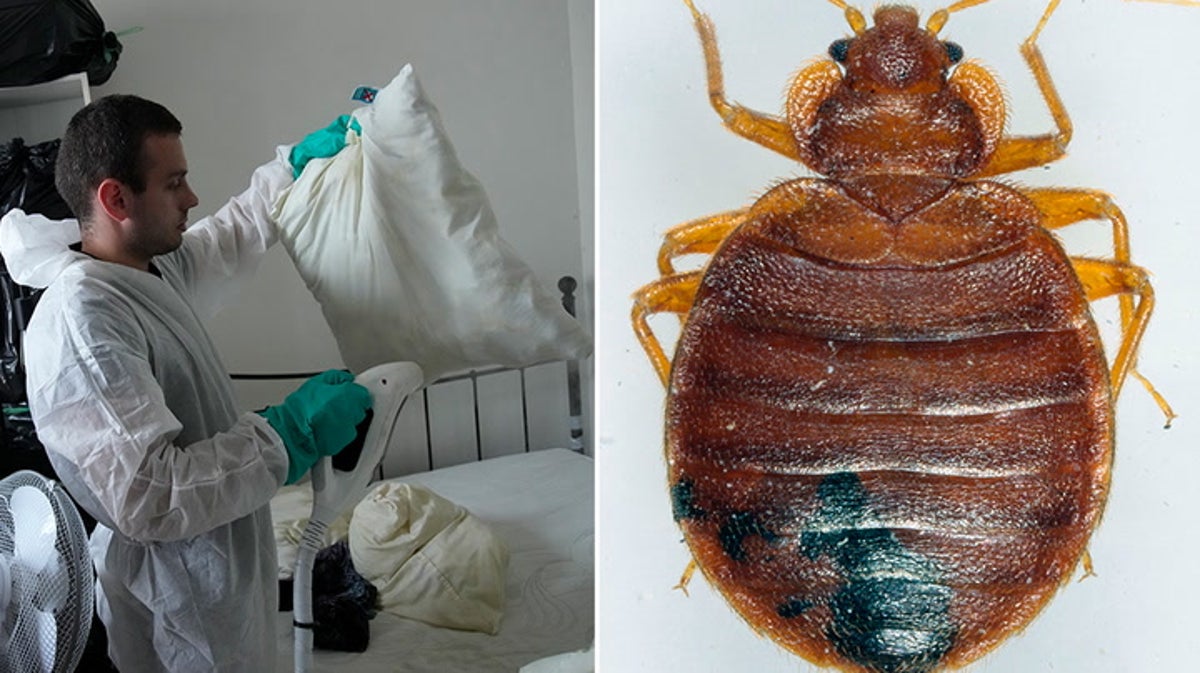
Londoners are refusing to sit on the tube after multiple sightings of bedbugs sparked fears of an outbreak.
Meanwhile, Paris has erupted into panic due to the ‘pandemic’ as the creepy crawlies have been spotted on trains, in hospitals, cinemas, and schools.
One video shows a Parisian street lined with mattresses as city dwellers clear their homes to attempt to remove the blood-sucking pests.
Closer to home, Luton City Council say their pest control service has received an alarming number of bedbug jobs.
The Mayor of London Sadiq Khan addressed the skin-crawling concerns and tried to appease residents of London at the Labour Party conference in Liverpool.
He said: “I want to reassure those listening TfL have one of the best regimes to clean our assets on a nightly basis and we’re speaking to our friends in Paris to see whether there are any lessons to be learned.
Bedbugs often live on mattresses— (Getty Images/iStockphoto)
“We don’t think those issues will arise in London, but no complacency from TfL.”
Jason Edwards, a pest control technician from London, says he has seen an increase in bedbug cases by 60% in the last six to eight weeks. He says none of the homes he has treated belong to people who have travelled from France, but one client had returned from elsewhere in Europe.
The threat of France’s bedbug outbreak spreading to London’s public transport network is ‘a real source of concern’, the capital’s mayor Sadiq Khan said (PA)— (PA Archive)
He admitted the critters generally are not harmful but noted the unpleasantness of having bugs crawling in your bed.
“There is not a lot you can do to stop them but if you think you have them, you should call pest control,” he said.
Due to their cunning nature and ability to hide and travel, they are hard to prevent admits Mr Edwards.
What is a bedbug?
Bedbugs are tiny parasites that often live on furniture or bedding. They are reddish-brown in colour and come out to feed and night.
They mature in about 45 days and their average lifespan is seven to 12 months, explain Terminix, a pest control service.
Pest control fumigating a flat in Paris and image of a bedbug— (AP)
Do bedbugs bite?
Bedbugs bite exposed skin such as the neck, face, hands, shoulders, arms and legs.
They often appear in a line or are grouped together, they can be raised and itchy. Sometimes people have allergic reactions to the bites creating further discomfort, explain the NHS.
On black or brown skin they may appear purple and on white skin they present as red, say the NHS.
Bedbug bites are visible on the back of a woman standing in a hotel room— (Getty Images/iStockphoto)
How to spot an bedbug infestation?
Mr Edwards from AA Pest Control 24/7 shared how to spot an infestation.
He said: “You check bed frames, head frames and under the mattresses and you should look for small black marks on sheets which are the eggs,red blood marks and feces.”
You can spot the critters in dark crevices and can survive in the seams of chairs, sofas and in drawer joints say the Environmental Protection Agency for the USA.
Bedbugs are seen in a sofa bed, in L'Hay-les-Roses, near Paris, France— (REUTERS)
How do bed bugs travel?
Travellers can easily pick up the pests when using public transport and staying in shared accomodation, for example, in hotels and dormitories.
The critters hide in luggage, overnight bags, clothes, bedding and furniture. Often, it is their eggs that are transported, explained Mr Edwards.
“The eggs are more transportable than the living bugs, they can attach to your clothes,” he said.
Recent videos on social media have exposed the travelling critters— (EPA)
Are there any ways of preventing bedbugs?
Unfortunately, the creepy crawlies have finessed modern day transport systems and are pros at hiding in small crevices.
Some travellers have opted to avoid sitting down on public transport, whereas others travellers returning from France have decided to take extra precautions.
One woman from the US brought bedbugs back from France but has told others what to do to avoid a problem, admitting it’s too late for her now.
She said: “When you get home quarantine your luggage, keep your luggage outside and wash your things on the highest heat possible, apparently you’re supposed to actually dry it first, then wash it, then dry it again.”
If you suspect you have been in contact with an infestation whilst travelling, Mr Edwards suggests you put your clothing on a hot wash of 60C as soon as you get home.
The NHS also recommend putting affected clothing and bedding in plastic bags to freeze for three to four days.
Despite no existing correlation between cleanliness and infestations, the health service recommend that people regularly clean and vacuum to spot new home invasions.
What to do if you suspect signs of an infestation?
There are bedbug treatments available to purchase online and in stores, but Mr Edwards explained they’re not always as effective as professional services.
He added: “I recommend calling pest control as they can be quite difficult to treat yourself.
“We use a chemical treatment which we think is more effective than heat treatments, it’s usually successful as the chemicals are very advanced now- sometimes we have to return to do another spray or two though.”







